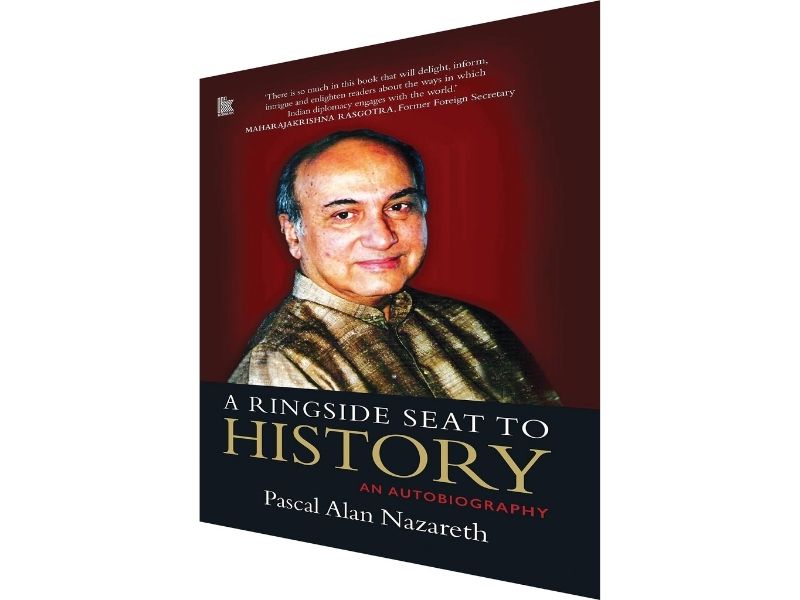A ringside seat to history: An autobiography; Pascal Alan Nazareth; Konark publishers; Rs.800; Pages 256
Amitabha Bhattacharya (The Book Review)

What exactly does an ambassador or a career diplomat do? Is the job about enjoying a comfortable life, mouthing high sounding ideals and engaging in protocol and immigration issues? How much scope is there for individual initiatives to play out? Reading through this autobiography, one would get a fairly good idea of life in the Indian Foreign Service (IFS), and of the difference a conscientious officer can make through his efforts.
Pascal Alan Nazareth comes from a distinguished family and was selected to the IFS in 1959. Like his peers, he served across different continents — in Indian missions in Tokyo, Rangoon, Lima, London, New York, as Director General of the Indian Council for Cultural Relations (ICCR), and later as High Commissioner to Ghana and Ambassador to Egypt and Mexico.
Nazareth’s father was a judge who served in several locations in south India and was keen that his son made it into the coveted Indian Administrative Service. His ideas were shaped by the young officers he used to meet in the districts. When Nazareth secured high rank in the competitive examination, he was called for interview at the ministry of external affairs in Delhi for selection into the IFS. Against his father’s wish, he went for the interview.
“I was greatly surprised to learn that I had been selected… and if I decided to accept the IFS and signed its acceptance letter, because I and others who did so would be taken to meet Shri Jawaharlal Nehru “not as prime minister but as foreign minister” at 5 p.m that evening. The prospect of meeting this much-loved, world-renowned leader was so exhilarating that I decided to sign the acceptance letter despite my father’s strong opposition to the IFS,” writes Nazareth.
At that meeting foreign secretary Subimal Dutt, informed Nehru, that HH the Dalai Lama had entered India that morning. (Nazareth would be meeting Dalai Lama a few months later while undergoing district training at Gaya!) As he admits, “…my ringside seat to history began on my very first day in the IFS.”
The whole book is enlivened by such episodes. As Nehru advised young IFS recruits on their first day, “I want to assure you that India does not expect you to lie on its behalf. Never tell a lie but always remember you have no obligation to reveal the truth! The less said the better; the best is to listen.”
While he was busy picking up the Japanese language at Tokyo, the tragedy of India’s Air Chief Marshal Subroto Mukherjee occurred. Mukherjee was received by Japan’s Air Force Chief and attended the customary dinner hosted by the Indian ambassador in his honour. As Nazareth subsequently learnt, Commodore Ghosh, long-time friend of Mukherjee, took him out for a Japanese dinner where sashimi (marinated raw fish) was served. Mukherjee “put one of these sticky rice and tuna morsels into his mouth; he not relishing it tried to gulp it down but it got stuck in his throat and he died before any medical aid could reach him.” Thus came the premature end of the father figure of the Indian Air Force in a far-off land at the young age of 49.
The author’s warmth and sensitivity exude through all the 14 chapters of the book. The interesting titles given to them like ‘Arrival on the “Chess Board of History”’, ‘Spiders, Tree Spirits and a Jewellery Crisis in Golden Pagoda Land’, ‘An Up-in-the-Sky Apartment & a Sleek Jaguar for Our James Bond in New York’, ‘A Frozen Lake in Chicago and a Miracle in New York’ and a ‘Virginity Test Crisis in London’ display the author’s wit. He narrates with élan how, for instance, the rich and influential Dharma Teja was apprehended and brought to justice, his witnessing a bloody coup in Ghana from close quarters, strengthening of ties with Peru during his tenure, and the like.
Nazareth juxtaposes all these events in public spaces with the highs and lows in his private life. The sudden and untimely death of his younger daughter, affliction by cancer of his only son and the accidental death of his younger brother had saddened him no end. Yet, an enlightened person deeply rooted in the tenets of Christianity, he remained optimistic. His sincere involvement with spreading the essential message of Gandhiji — satya, ahimsa, sarva dharma sama bhava and sarvodaya — post-retirement, speaks volumes of his commitment to public causes. His open-minded and secular approach to life, flair for writing and his sense of humour illuminate every page of the book.
This labour of love would benefit aspiring diplomats and the general reader alike for the wealth of information it contains and the freshness of insight that the author brings to bear on every decisive moment of his enriched life.
Also Read: Under dragon shadow: Eat the Buddha























